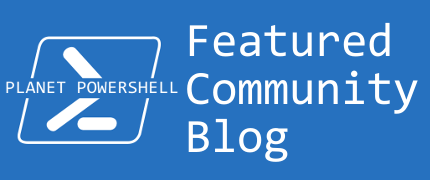Welcome!
The goal of PlanetPowerShell is to provide an aggregated feed of PowerShell community content. If you write about PowerShell, then jump in and add your blog to the feed. The only thing we wask is that you do not violate the community code of conduct
This site couldn't have been made without the help of Readify and the Planet Xamarin team (who I have blatantly stolen the content from, yay Open Source!). For more information see the Acknowledgements.
- I have a valid blog & RSS URL
- Host NO malicious or offensive content on the blog (including photos, swearing, etc.)
- Blog is active with atleast 3 PowerShell related blog posts in the last 6 months
- Blog content is my own, and is not someone elses work
- The content is not sales focused
- If the blog has mixed content (PowerShell and Personal/Non-PowerShell blogs) a filter has been applied
- If you delete your blog you will come delete your blog from Planet PowerShell
- Your blog may be removed at any time if any of these are broken.
Adding yourself as an author is easy! All you need to do is fork this project, and add a file to the src\Firehose.Web\Authors\ folder.
The author file is a C# class that implements the IAmACommunityMember interface. It doesn't matter if you don't know C# though: just follow the many examples already there.
You can even do this via the GitHub editor. If you have never done anything like this, there are plenty of people that can help!
The result should look something like this:
public class BruceWayne : IAmACommunityMember
{
public string FirstName => "Bruce";
public string LastName => "Wayne";
public string ShortBioOrTagLine => "potentially batman";
public string StateOrRegion => "Gotham";
public string EmailAddress => "[email protected]";
public string TwitterHandle => "batman";
public string GravatarHash => "42abc1337def";
public string GitHubHandle => "batman";
public GeoPosition Position => new GeoPosition(47.643417, -122.126083);
public Uri WebSite => new Uri("https://planetpowershell.com/");
public IEnumerable<Uri> FeedUris { get { yield return new Uri("https://planetpowershell.com/rss"); } }
}A few things:
- Don't worry about touching the
.csprojfile; it'll pick up the author file from the folder automatically - Name the class after your first and lastname with CamelCase
- The
FirstNameandLastNameproperty should resemble that same name ShortBioOrTagLineproperty can be whatever you like. If you can't think of anything choose: 'software engineer' or 'software engineer at Microsoft'StateOrRegionwill be your geographical location, i.e.: Holland, New York, etc.EmailAddress,TwitterHandleandGitHubHandleshould be pretty clear,TwitterHandlewithout the leading @- The
Websiteproperty can be your global website or whatever you want people to look at Positionis your latitude and longitude, this allows you to be placed on the map on the Authors page- And finally with
FeedUrisyou can supply one or more URIs which resemble your blogs. Your blogs should be provided in RSS (Atom) format and of course be about PowerShell. - If you do not want your e-mailaddress publicly available but you do want to show your Gravatar go to https://en.gravatar.com/site/check/ and get your hash! If you don't fill the hash, you will be viewed as a silhouette.
- When you are a Microsoft MVP check out the
IAmAMicrosoftMVPinterfaces, see below for a small sample.
If you also do some blogging about other stuff, no worries! You're fine! Just have a look at the next section on how to filter out your PowerShell specific posts.
Let us know that you are a Microsoft MVP using the IAmAMicrosoftMVP interface.
public class MVPGuy : IAmAMicrosoftMVP
{
public string FirstName => "Awesome";
public string LastName => "Sauce";
public string ShortBioOrTagLine => "unicorn tamer";
public string StateOrRegion => "127.0.0.1";
public string EmailAddress => string.Empty;
public string TwitterHandle => "theboss";
public string GravatarHash => "42abc1337def";
public string GitHubHandle => "theboss";
public GeoPosition Position => new GeoPosition(47.643417, -122.126083);
public Uri WebSite => new Uri("http://www.awesomesite.com");
public IEnumerable<Uri> FeedUris { get { yield return new Uri("http://www.awesomesite.com/feed/"); } }
}Planet PowerShell is all about PowerShell content. To ensure that the feed only contains relevant content you can implement the IFilterMyBlogPosts interface on your author class.
public class BruceWayne : IAmACommunityMember, IFilterMyBlogPosts
{
// ... Author properties from the above class, removed for brevity
public bool Filter(SyndicationItem item)
{
// Here you filter out the given item by the criteria you want, i.e.
// this filters out posts that do not have PowerShell in the title
return item.Title.Text.ToLowerInvariant().Contains("powershell");
// This filters out only the posts that have the "PowerShell" category
return item.Categories.Any(c => c.Name.ToLowerInvariant().Equals("powershell"));
// Of course you can make the checks as complicated as you want and combine some stuff
return item.Title.Text.ToLowerInvariant().Contains("powershell") && item.Categories.Any(c => c.Name.ToLowerInvariant().Equals("powershell"));
}
}A big step for mankind! Last thing that remains is submit a Pull Request to us and whenever it gets merged: hooray! You're an author now!
Don't forget to incorporate the Featured on Planet PowerShell badge on your blog and link back to us!
Enjoy all of our great content!
Of course you are more than welcome to submit other features and bugfixes as well.
- Thanks to Readify/Telstra Purple for open sourcing their employee blog aggregation platform, which Planet Xamarin forked.
- Big thanks to Planet Xamarin, they really did a lot of the hard work in getting this setup.
- Thanks to our awesome contributors and our community of authors who make this all possible.
